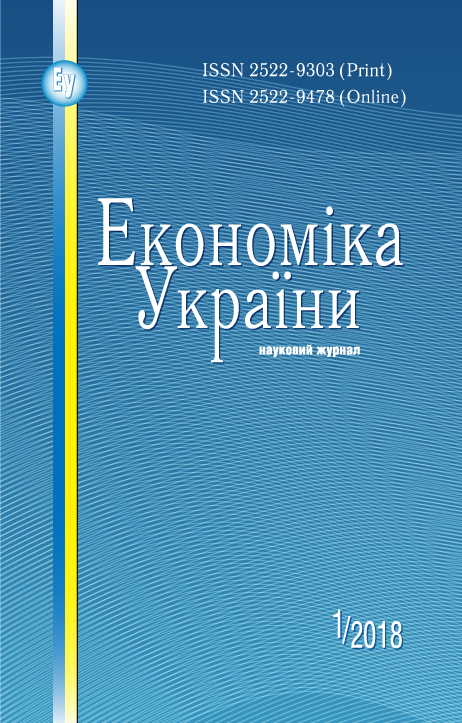ECOSYSTEM APPROACH TO VALUATION OF DAMAGE FROM ENVIRONMENTAL POLLUTION
DOI:
https://doi.org/10.15407/economyukr.2018.01.054Keywords:
ecosystem estimation methodology, ecosystem approach, theory of losses, value of the “work” of ecosystem\\\'s assimilation potential, coefficients of assimilationAbstract
In connection with Ukraine’s preparation to accession to the EU, legislative acts include provisions for the implementation of an ecosystem approach to managerial practice. Therefore, it is important to develop methodological approaches to valuation of damage from environmental pollution based on the use of the ecosystem approach. The following issues are developed: (i) innovative methodology of ecosystem estimation of such losses; (ii) corresponding author’s model of estimation; (iii) classification of these losses; (iv) methods of differentiation of the size of its’ compensation depending on the type of ecosystem, which is a novelty of the research.
The main directions of development of the theory of losses from volley and other accidental pollutions, taking into account ecosystem principles (including factor of time), are presented. It is established that (unlike traditional ones) the most up-to-date in foreign practice and the newest method of estimating economic losses from environmental pollution is their valuation on the basis of the cost of restoration works, since this takes into account the market value of resources and services involved in the work on restoration, i. e. rehabilitation of degraded ecosystems to the state preceding the damage caused. Under the modern technology development, the basis for such a valuation may be the conditional equalization of the cost of “work” of an assimilation potential of ecosystem to the cost of work of an artificial waste recycling plant.
An example of estimation of the cost of “work” of the assimilation potential of the soil ecosystem and the use of ecosystem approach to valuation of damage from soil contamination, based on estimation of the cost of remediation and bioremediation of soils, is presented.
On the basis of the author’s methodological approach, the size of the correlation coefficients accounting the assimilation properties of ecosystems is determined for differentiation of the volume of compensation of economic losses from volley and other accidental pollutions (as a component of the author\\\'s economical classification of assimilation services of ecosystems of Ukraine).
References
Balats'kii O.F. Teoreticheskie i Prakticheskie Voprosy Opredeleniya Ekonomicheskogo Ushcherba ot Zagryazneniya Okruzhayushchei Sredy [Theoretical and Practical Issues of Determining the Economic Damage from Environmental Pollution]. Kyiv, Znanie, 1982 [in Russian].
Westerholm D.G., Rauch III S.D. Deepwater Horizon Oil Spill: Final Programmatic Damage Assessment and Restoration Plan and Final Programmatic Environmental Impact Statement. Silver Spring, MD, United States Department Of Commerce, National Oceanic and Atmospheric Administration, 2016.
Ekonomika Sokhraneniya Bioraznoobraziya. Spravochnik [Economics of Biodiversity Conservation. A Handbook]. A.A. Tishkov (Ed.). Moscow, GEF Project "Conservation of Biodiversity of the Russian Federation", Institute of Environmental Economics, 2004 [in Russian].
Golubeva E.M. Ekosistemnyi podkhod k otsenke zagryazneniya reki Amur toksichnymi elementami [Ecosystem approach to the assessment of pollution of the Amur River by toxic elements]. Candidate's thesis. Khabarovsk, 2012 [in Russian].
Puntsukova S.D. Metody ekonomicheskoi otsenki lesnoi ekosistemy regiona [Regional forestry eco-system: methods of evaluation (Russia, Ulan-Ude)]. Problemy sovremennoi ekonomiki - Problems of Modern Economics, 2014, No. 3, pp. 314-319 [in Russian].
Yazhlev I.K. O sostoyanii metodicheskogo obespecheniya otsenki ushcherba prirodnoi srede v Rossiiskoi Federatsii i za rubezhom [The study of the state of the methodology support of environmental damage evaluation in the Russian Federation and abroad]. Teoriya i praktika sudebnoi ekspertizy - Theory and Practice of Forensic Science, 2009, No. 3 (15), pp. 194-221 [in Russian].
Il'icheva M.V. Metody otsenki ekonomicheskogo ushcherba ot negativnogo vliyaniya zagryaznennoi sredy [Methods for assessing economic damage from the negative impact of contaminated environment]. Izvestiya Chelyabinskogo nauchnogo tsentra (razdel: Ekonomika i menedzhment) - Proceedings of the Chelyabinsk Scientific Center. Section: Economics and Management, 2005, Iss. 3 (29), pp. 112-116 [in Russian].
Grebenshchikov S.E. Metody opredeleniya ekonomicheskogo ushcherba ot zagryazneniya okruzhayushchei sredy [Methods for determining the economic damage from environmental pollution], September 16, 2014, available at: lexandbusiness.ru/view-article.php?id=4025 [in Russian].
Suhina O.M. Ekoloho-ekonomichni priorytety reabilitatsii hirnychopromyslovykh rehioniv [Ecological and economic priorities for the rehabilitation of mining and industrial regions]. Candidate's thesis. Kyiv, 2002 [in Ukrainian].
Krieger D. The Economic Value of Forest Ecosystem Services: a Review. Washington, D.C., The Wilderness Society, 2001.
Gerasimchuk I., Sokolov I., Shvarts E. Kto zaplatit za prirodu [Who will pay for nature], September 7, 2011, available at: www.vedomosti.ru/opinion/articles/2011/09/07/stoimost_prirody [in Russian].
Downloads
Published
How to Cite
Issue
Section
License
Copyright (c) 2024 Economy of Ukraine

This work is licensed under a Creative Commons Attribution-NonCommercial-NoDerivatives 4.0 International License.



